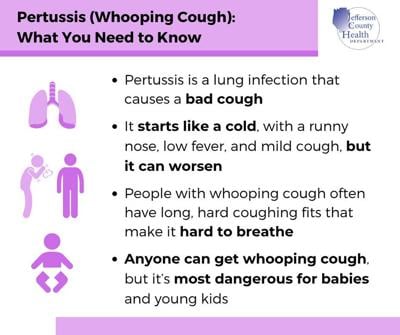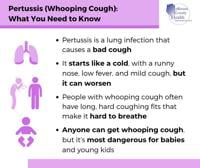The Jefferson County Health Department announced this afternoon, Oct. 29, that it has been seeing more whooping cough cases than usual for this time of year.
Whooping cough, also known as pertussis, is a serious, highly contagious illness caused by bacteria. It usually starts like a cold with a runny nose, mild cough and low fever, but the cough can worsen and people can develop long, hard coughing fits that make it hard to breathe, the Health Department’s public health alert said.
As of Sept. 30, the Health Department had received reports of 23 whooping cough cases in Jefferson County so far this year. No data for October is available because the state’s data system is down, said Brianne Zwiener, communications manager for the Health Department.
In 2024, the Health Department reported a total of 31 cases of whooping cough in Jefferson County for the year, she said.
Zwiener said the number of whooping cough cases in the county may be higher than 23 because once a person in the house tests positive, some providers write a prescription for other household members without testing.
According to the public health alert, anyone can get whooping cough, but it is especially dangerous for babies and young children. Parents should watch their children for a cough that gets worse and comes in fits and includes a whooping sound when breathing in after coughing. Parents should watch infants for pauses in breathing or difficulty breathing, as well as for the child turning blue.
Whooping cough spreads through the air when someone who is sick coughs or sneezes.
With cases rising, prevention is important, and vaccination, as well as good hygiene, is the best protection, the Health Department reported.
Zwiener said the Health Department offers DTaP and Tdap (pertussis booster) vaccinations at its Hillsboro office, 1515 Peach Tree Plaza Court, and at its Arnold office, 1818 Londell Road. She said residents may call the office at 636-797-3737 to schedule an appointment or to find out if or when the people had received the vaccines.
According to the Health Department, DTaP (diphtheria/tetanus/pertussis) is for young children, and they receive five doses. Tdap (tetanus/diphtheria/pertussis), a booster vaccine, is for preteens ages 11-12, or pregnant women (27-36 weeks) of each pregnancy, or adults who have never received the vaccine or who will be around newborns and haven’t had it in the past 10 years.
The Missouri Department of Health and Senior Services recommends adolescents and adults get one lifetime dose of the booster vaccine and anyone who is exposed to whooping cough immediately should be given antibiotics to prevent the disease.
Zwiener said with the fourth week of respiratory season underway, it’s important for people to get vaccinated against vaccine-preventable illnesses; practice good hand hygiene and cough etiquette; and stay home if they are sick.
According to the American Lung Association, whooping cough can occur throughout the year but tends to peak in summer and fall months.
If you or your child is experiencing symptoms, especially a cough that won’t go away or comes in fits, contact your health care provider. Testing for whooping cough is available at most doctors’ offices and urgent care clinics, the Health Department reported.





